|
|
|
Sort Order |
|
|
|
Items / Page
|
|
|
|
|
|
|
| Srl | Item |
| 1 |
ID:
153268
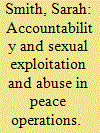

|
|
|
|
|
| Summary/Abstract |
In March 2016, the United Nations Security Council adopted its first resolution devoted entirely to the prevention of peacekeeper sexual exploitation and abuse (SEA) in peace operations. This article examines resolution 2272 by drawing on past practice and the perspective of those at mission sites—namely, Timor-Leste—arguing that the mechanism it establishes—repatriation—is limited in its capacity to prevent SEA and provide justice outcomes. The article demonstrates the pervasive sense of powerlessness regarding SEA and the impunity of those who do perpetrate SEA. The article further situates the issue of SEA by peacekeepers in the post-conflict (gendered) context in which it occurs, arguing that the resolution does not challenge the underlying norms and gendered relations of power that underpin peace operations. Instead, the resolution frames SEA as chiefly an issue of embarrassment for the United Nations and makes scant mention of the populations that peace operations are mandated to protect, as well as the perspectives and needs of victims of SEA.
|
|
|
|
|
|
|
|
|
|
|
|
|
|
|
|
| 2 |
ID:
103592
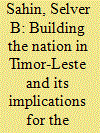

|
|
|
|
|
| Publication |
2011.
|
| Summary/Abstract |
This article contributes to the discussion of the international democratisation of the so-called 'post-conflict' or 'fragile' countries by addressing one of the most important but least studied issues in the literature-the relationship between democracy and nation-building. It does so by analysing the major socio-political aspects of the democratic nation-state-building process in Timor-Leste in the post-1999 period. It argues that contemporary international democratisation policies and practices prioritise the 'stateness' problem, conceptualised by reference to a set of organisational, procedural and functional concerns. Little attention is, however, paid to the 'nationness' question. As the experience in Timor-Leste indicates, it is the national ideas that determine the structural and operational parameters of democratisation, which is, after all, a process of socio-political transformation by which political power and wealth are redistributed amongst a variety of competing societal interests.
|
|
|
|
|
|
|
|
|
|
|
|
|
|
|
|
| 3 |
ID:
103593
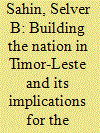

|
|
|
|
|
| Publication |
2011.
|
| Summary/Abstract |
This article contributes to the discussion of the international democratisation of the so-called 'post-conflict' or 'fragile' countries by addressing one of the most important but least studied issues in the literature-the relationship between democracy and nation-building. It does so by analysing the major socio-political aspects of the democratic nation-state-building process in Timor-Leste in the post-1999 period. It argues that contemporary international democratisation policies and practices prioritise the 'stateness' problem, conceptualised by reference to a set of organisational, procedural and functional concerns. Little attention is, however, paid to the 'nationness' question. As the experience in Timor-Leste indicates, it is the national ideas that determine the structural and operational parameters of democratisation, which is, after all, a process of socio-political transformation by which political power and wealth are redistributed amongst a variety of competing societal interests.
|
|
|
|
|
|
|
|
|
|
|
|
|
|
|
|
| 4 |
ID:
174097
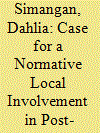

|
|
|
|
|
| Summary/Abstract |
Liberal peacebuilding’s imperfect record of involving local actors in rebuilding post-conflict societies paved the way for the local turn in peacebuilding. One of the issues the local turn highlights is local involvement in peacebuilding processes. Drawing from the experiences of previous peacebuilding missions in Cambodia, Kosovo, and Timor-Leste, this paper contributes to the local turn by identifying the types of local involvement in peacebuilding and their consequences on post-conflict societies. This identification could be useful in steering the local turn away from the same flawed local involvement that brought liberal peacebuilding into crisis. The analysis in this paper demonstrates how exclusive, superficial, non-representative, and politicized types of local involvement failed to achieve or sustain peace in Cambodia, Kosovo, and Timor-Leste. The conflict-promoting tendencies of these types of local involvement make a case for a normative agenda that is inclusive, substantive, representative, and transformative.
|
|
|
|
|
|
|
|
|
|
|
|
|
|
|
|
| 5 |
ID:
120009
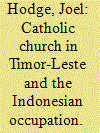

|
|
|
|
|
| Publication |
2013.
|
| Summary/Abstract |
During the Indonesian occupation of Timor-Leste (1975-99), the Roman Catholic Church grew in importance to the East Timorese people. This is demonstrated by the large increase in Timorese affiliation to the Church: 25-30% of the populace were baptized Catholics in 1975 compared with over 90% in the 1990s. Various explanations have been offered for this growth, many of which identify 'extrinsic' factors such as the religious prescriptions of Indonesian law or the pressures of Islamization. While acknowledging the importance of these factors, this paper argues that certain intrinsic factors substantially influenced the identification of the Timorese experience of occupation with Catholic faith and solidarity. An understanding of these intrinsic factors can provide a more expansive understanding of Timorese culture, experience and history. Drawing on original research into the faith and experience of Timorese people during the occupation, the author explores the relationship between suffering, resistance and the Catholic faith of the Timorese in four areas: language; 'a spirituality of resistance'; martyrdom; and sanctuary and advocacy for the persecuted. The paper draws on the insights of French philosopher and literary critic, René Girard, regarding the importance of Christianity in the context of violence. Girard has argued for a particular understanding of the centrality of the victim in human culture and of how Christianity helps to reveal this centrality. Girard's perspective sheds light on how the Timorese came to terms with their experience of suffering and violence under Indonesian occupation through their identification with Jesus Christ and the Church.
|
|
|
|
|
|
|
|
|
|
|
|
|
|
|
|
| 6 |
ID:
089514
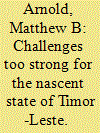

|
|
|
|
|
| Publication |
2009.
|
| Summary/Abstract |
Timor-Leste was badly shaken by a violent national crisis from April 2006 to April 2008. Central to the turmoil were the presence and actions of two groups of ex-soldiers from the Timorese army, known as "petitioners" and "mutineers." This article examines their roles in driving the crisis, by empirically mapping their history, motivations, and relationships
|
|
|
|
|
|
|
|
|
|
|
|
|
|
|
|
| 7 |
ID:
072351
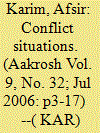

|
|
|
| 8 |
ID:
133090
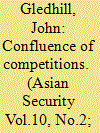

|
|
|
|
|
| Publication |
2014.
|
| Summary/Abstract |
In April 2006, riots broke out on the streets of Dili. As violence escalated over the weeks that followed, a beacon of liberal peace-building dissolved into near-anarchy. While there have been several accounts of Timor-Leste's "crisis" of 2006, it remains unclear why violence spiraled at that time, rather than at an earlier point in the country's post-conflict transition. This article addresses that temporal puzzle by combining an analysis of the structural origins of the crisis with discussion of proximate, agency-driven triggers to violence. The resulting narrative first details the development of competition between governing elites, and also between state security actors, over the years following independence. The fusion of those two dynamics of competition in 2006, I then argue, created conditions sufficient for violent conflict.
|
|
|
|
|
|
|
|
|
|
|
|
|
|
|
|
| 9 |
ID:
175361
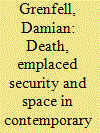

|
|
|
|
|
| Summary/Abstract |
By adopting a spatial approach to analysis, this article examines the significance of death in Timor-Leste and its relationship to security and peace. The main argument is that a person’s security in Timor-Leste is very often made possible via the sustaining of what is referred to here as ‘cognate communities’ which comprise both the living and the spirits of the ancestral dead. Grave-making as a form of ‘emplaced security’ – an expression of agency which results in the creation or transformation of a place in order to mitigate threat – enables a particular kind of space whereby the living as part of cognate communities are able to venerate their dead. In turn, engagement with the ‘spatial turn’ demonstrates how this form of emplaced security is not static, but rather is dynamic and adaptive as communities formed through custom constantly interact with broader social changes and spatial transformations. Even as grave-making represents a micro-form of emplacement, such acts both produce and respond to different spatial orders, including more abstract forms bound up with nation formation. As such, the ‘spatial turn’ shows how burial represents both an intimate and petite act of place-making while also intersecting with different spatial orders and scales that interact with meta-narratives including religion, modernisation and nationalism.
|
|
|
|
|
|
|
|
|
|
|
|
|
|
|
|
| 10 |
ID:
191570


|
|
|
|
|
| Summary/Abstract |
Environmental peacebuilding is the integration of natural resource management into conflict prevention, resolution and recovery so as to support peace and environmental sustainability. Most studies have been of cases where there is significant involvement of external (usually international) actors. They thus provide implicit support for liberal peacebuilding practice, which is itself the subject of much critique. Conversely, documented examples of environmental peacebuilding from below are rare. We analyse an endogenously emerging environmental peacebuilding institution, the customary tara bandu process in Timor-Leste. We explain the way tara bandu is used bottom-up to promote the sustainable use of natural resources and more peaceful relations. Tara bandu proves to be a successful, locally diverse environmental peacebuilding institution. We further show how recent attempts by international peacebuilders and state institutions to employ tara bandu have somewhat ignored the way it is deeply interwoven with local social and spiritual relations, and in so doing have jeopardized its legitimacy and efficacy. This suggests that attempts from outside actors to facilitate environmental peacebuilding may be constrained by a mismatch between theorized norms of social and environmental relations (such as ‘shared interests’) and local cultural particularities.
|
|
|
|
|
|
|
|
|
|
|
|
|
|
|
|
| 11 |
ID:
160931
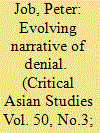

|
|
|
|
|
| Summary/Abstract |
As research by the Commission for Reception, Truth and Reconciliation in East Timor documents, the years 1975–1980 constituted the worst period of the Indonesian occupation of East Timor, during which grave human rights took place involving a high loss of life. In Australia, the government headed by Prime Minister Malcolm Fraser (1975–1983) sought to present itself as a supporter of human rights and the international rule of law. It also prioritized relations with the Suharto regime, which it saw as key to its policy position in Southeast Asia. These two positions came into conflict due to the Indonesian invasion of East Timor. The Fraser government therefore worked to propagate a narrative concerning East Timor which denied the seriousness of the situation, distorted the historical narrative, deflected blame from Indonesia, and depicted the Australian position as principled and realistic. This paper examines the development of this narrative as events progressed and information concerning the crisis in East Timor came to the attention of the outside world. It also examines how the Fraser government employed this narrative internationally in order to protect the Suharto regime from scrutiny.
|
|
|
|
|
|
|
|
|
|
|
|
|
|
|
|
| 12 |
ID:
160259


|
|
|
|
|
| Summary/Abstract |
Since regaining its independence in 2002, nation-building has been the focus of much scholarly research on Timor-Leste. National identity construction is a crucial aspect of this process, yet the ways in which this identity is officially represented has been largely overlooked. This article takes the national flag of Timor-Leste as a case study to explore the ways in which a historic East Timorese national identity has been symbolically constructed and visually embodied. By considering the potency of flags in an East Timorese cultural context, and by analysing the origins of Timor-Leste's flag alongside that of the political party Fretilin (Frente Revolucionária do Timor-Leste Independente), it becomes clear that post-independence re-imaginings of its symbolism have rendered it a powerful national symbol in the contemporary nation-state.
|
|
|
|
|
|
|
|
|
|
|
|
|
|
|
|
| 13 |
ID:
142669
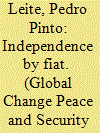

|
|
|
|
|
| Summary/Abstract |
Western Sahara and Timor-Leste (East Timor) are twin cases marking an incomplete end to the era of decolonization. The two are remarkably similar: they are former European colonies with peoples who had been promised self-determination only to be invaded within weeks of each other in late 1975 by neighboring states, themselves recently decolonized. Decades would pass while the international community stood by. The people of Timor-Leste eventually achieved freedom against the odds while most of Western Sahara and half the Saharawi people remain under foreign occupation, the scene of established human rights violations and the ongoing export of natural resources. For 25 years, Morocco has refused the Saharawi people a referendum, with the United Nations organization unable to respond as a result of a threatened veto by some permanent members of the Security Council. However, a Saharawi state arguably has come into being, enjoying popular legitimacy, governing institutions and accepted control over a part of Western Sahara. Moreover, regionally and within the African Union, the Saharawi Republic enjoys broad recognition and advocacy for its people. While drawing on lessons from the comparative experience of self-determination in Timor-Leste, this paper contends that the UN should follow the example of the African Union and welcome the Saharawi Republic as a member state. To achieve that result, a wider recognition among states is needed. The UN General Assembly, by employing its 1950 Uniting for Peace resolution, can decide to ‘consider the matter immediately' and compel a breakthrough which the Security Council has so far not been able to deliver.
|
|
|
|
|
|
|
|
|
|
|
|
|
|
|
|
| 14 |
ID:
183456


|
|
|
|
|
| Summary/Abstract |
Indonesia invaded East Timor in 1975 and occupied it for the next 24 years with the military and diplomatic support of major powers. Despite its insistence that its annexation was irreversible, Indonesia was forced to withdraw in 1999, resulting in an independent East Timor. This article explains how the 24-year war against East Timor ended by analysing the three pillars on which Indonesia’s control rested: its military superiority over the East Timorese resistance; the support of the international community; and its determination to retain the territory. Indonesia’s overwhelming military superiority persisted until the very end. East Timorese resistance and international solidarity weakened international support for the occupation. Indonesia’s determination to retain the territory underwent a complete reversal over the course of 1999. The East Timorese resistance was successful although they lacked a land border with a friendly state, an external supplier of weapons, or a liberated area in which to recover between guerrilla operations.
|
|
|
|
|
|
|
|
|
|
|
|
|
|
|
|
| 15 |
ID:
134032
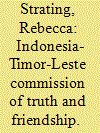

|
|
|
|
|
| Publication |
2014.
|
| Summary/Abstract |
International justice is characterized by the global articulation of basic human rights and peremptory norms outlawing crimes against humanity. In the twenty-first century, an international obligation of states to pursue individuals who bear responsibility for gross violations of human rights has formalized. Since the 1999 independence referendum, Timor-Leste has struggled to achieve substantive justice for the human rights violations committed during Indonesia's 25-year de facto administration. Timor-Leste provides a unique case study on the international dimensions of pursuing justice in a post-conflict transitional context, particularly as many alleged perpetrators of rights violations have been shielded by Indonesia. This presents a challenge for Timor-Leste in balancing its various international and domestic priorities: while domestic political order and rule of law necessitates the pursuit of substantive justice, Timor-Leste's external security interests require a positive relationship with Indonesia. This article examines the world's first bilateral Truth and Reconciliation Commission, the Indonesia-Timor-Leste Commission of Truth and Friendship. It then analyses the implementation of the Commission's recommendations by Indonesia and Timor-Leste. The paper argues that the Commission was primarily a political mechanism designed to support international priorities rather than substantive justice.
|
|
|
|
|
|
|
|
|
|
|
|
|
|
|
|
| 16 |
ID:
183455


|
|
|
|
|
| Summary/Abstract |
The Westphalian system provides the global context of international relations within which the recent and contemporary ‘small wars and insurgencies’ of Maritime Southeast Asia have developed. Usually dated to the Peace of Westphalia in 1648, ending the Thirty Years’ War in Europe, the Westphalian system located sovereignty in states, following the principle of cuius regio, eius religio (whose realm, their religion). This system replaced arrangements where sovereignty was more mixed, leading at times to conflict over the location of authority.
|
|
|
|
|
|
|
|
|
|
|
|
|
|
|
|
| 17 |
ID:
106706
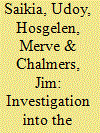

|
|
|
| 18 |
ID:
151447
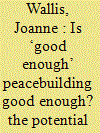

|
|
|
|
|
| Summary/Abstract |
There is a palpable sense of humility within the United Nations and other international institutions regarding peacebuilding. Rather than seeking to implement the liberal peace, they now pursue the more modest goal of ‘good enough’ outcomes. This shift reflects a growing consensus in the critical literature that space needs to be provided for the local agency that will ultimately determine the outcomes of peacebuilding. At first blush this emphasis on local agency is positive; it offers an important correction to the technocratic and generally top-down nature of liberal peacebuilding. But, is the ‘good enough’ approach to peacebuilding good enough? What are the pitfalls and potential of the local turn? This article uses a case study of Timor-Leste to answer these questions. It finds that the local turn can help lend legitimacy to the state and increase opportunities for political participation and the delivery of public goods at the local level. However, the emerging evidence from Timor-Leste also highlights the pitfalls of the local turn. Most significantly, the state can transfer responsibility for public goods provision to the local level in order to lessen the burden on the state and to divert attention from ineffective or illegitimate central institutions.
|
|
|
|
|
|
|
|
|
|
|
|
|
|
|
|
| 19 |
ID:
181947


|
|
|
|
|
| Summary/Abstract |
The development of land rights programs is deeply rooted in power relations. Using discourse analysis, this paper unpacks how Western logics (assumptions and conventions) regarding ‘best practices’ for property rights institutions and tenure security impact the design of peacebuilding programs. In 2017, the Government of Timor-Leste passed a controversial Land Law Package. These laws were initially developed for a USAID land reform program. But local dynamics, actions, and interests were ignored. Examining civil society exclusion from decision-making infers a reluctance to acknowledge local voices and practices that threaten liberal peacebuilding interests. This paper is organised into two parts. In the first, we argue that peacebuilding ‘best practices’ reflect how dominant Western discourses create conceptual boundaries (‘violent hierarchies’) to restrict the recognition of indigenous ideas as legitimate. In the second, we examine Timorese civil society efforts to improve the land reform program through acts of resistance to bodies of authority. Overall, we illuminate how in Timor-Leste Western assumptions and conventions contributed to boundaries to local participation, which contradicts liberal narratives of empowerment and capacity-building.
|
|
|
|
|
|
|
|
|
|
|
|
|
|
|
|
| 20 |
ID:
142081
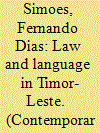

|
|
|
|
|
| Summary/Abstract |
As in other post-conflict states, the international community has been actively promoting the implementation of the rule of law in Timor-Leste. The justice system remains the weakest branch of Timor-Leste’s governance architecture. The effectiveness of the justice system is hampered by the fact that laws and proceedings are not always translated into languages understood by all court actors. Timor-Leste has a long history of multilingualism, with at least sixteen language varieties being spoken in the country. Both Tetum and Portuguese are official languages, with Portuguese being predominantly used in the courts, even though less than 10 per cent of the population is fluent in the idiom. The post-colonial legacy was one of two separate legal systems — the formal legal system and the traditional system — operating in parallel. More than a decade after independence, the former continues to have only a peripheral presence in the lives of most East Timorese. This gap between the language of the people and the language of the courts heightens the challenges to nation- and state-building in Timor-Leste. The purpose of this article is to examine the current language policy in Timor-Leste and discuss possible avenues for strengthening the formal justice system in a multilingual environment.
|
|
|
|
|
|
|
|
|
|
|
|
|
|
|
|
|
|
|
|
|